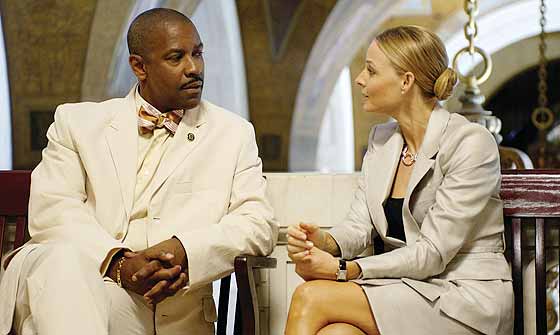
With even retired Supreme Court justice (and Reagan appointee) Sandra Day O’Connor warning of the “beginnings” of a dictatorship, it’s the perfect moment for the ridiculous but riotously enjoyable revolutionary comic-book thriller V for Vendetta—which will doubtless outrage conservatives and unnerve fuddy-duddys but liberate the rest of us with its magisterial irresponsibility.
Adapted by the Wachowski brothers from Alan Moore and David Lloyd’s graphic novel, the film unfolds in a totalitarian Britain of the near future, some years after a series of devastating terrorist attacks has put the kibosh on civil liberties. The model is clearly the Soviet Union by way of Orwell, but Thatcherism inspired the original eighties comic book, and it’s hard to miss the Wachowskis’ mischievous gibes at the present U.S. regime. This isn’t an earnest civics lesson like Good Night, and Good Luck. The masked avenger who calls himself “V” (Hugo Weaving) blows things up real good and gleefully chases his conflagrations with fireworks and the booming 1812 Overture. V lectures his protégée, aptly named Evey (Natalie Portman), in the ethos of muckraking, burlesque, sexual freedom, and anarchism. “People should not be afraid of their governments,” he proclaims. “Their governments should be afraid of them.” Given his habit of assassinating apparatchiks, exploding landmarks, and hijacking TV networks, his government is certainly afraid of him.
As they demonstrated in The Matrix and its ponderous sequels, the Wachowskis gravitate to messiahs who strive to overthrow repressive social orders, but V for Vendetta never bogs itself down in religious allegory or woo-woo mysticism. It’s a pop hodgepodge. V is part Zorro, part Cyrano, and part Phantom of the Opera, with a touch of Tim Burton’s Batman. His mask is modeled on Guy Fawkes, executed in 1606 for attempting to dynamite the English Parliament, and that smiling papier-mâché visage seems remarkably alive—especially when it’s underscored by Weaving’s rolling baritone. The actor (he was the antichrist Agent Smith in The Matrix) is currently bringing down the house as a preening, sadistic Judge Brack opposite Cate Blanchett in Hedda Gabler at the Brooklyn Academy of Music; he’s a hambone with a rapier edge.
V and Evey meet sort of cute: He uses knives and lightning martial-arts moves to dispatch the undercover police goons menacing her, then further demonstrates his potency by blowing up the Old Bailey. The director, James McTeigue (he was the assistant director on the Matrix movies), achieves a delirious swashbuckler tone with splashes of bejeweled blood and dollops of Grand Guignol horror. A former prisoner and lab rat in a hush-hush government research facility, V relishes his complicated schemes—and so does McTeigue, who devises a bravura montage around the image of V exulting over a field of tumbling dominos. The avenger gleefully materializes in the homes of government lackeys who done him wrong. It’s a hoot to see him terrorize the official “Voice of London,” Prothero (Roger Allam), a TV windbag who evangelizes against enemies of the state. But there’s a haunting dissonance when he comes for an already guilt-ridden physician (Sinéad Cusack). A three-dimensional vigilante picture needs (at least) one non-triumphant execution to gum up the machine.
V for Vendetta is otherwise pretty black-and-white—maybe too white in the case of Evey, a colorless ingenue who spends much of the picture lolling around V’s underground lair with its vintage jukebox and works of “forbidden” art. Evey might seem less of a goody two-shoes if she’d begun—as in the graphic novel—by turning tricks for money; and her relationship with another TV host, a melancholy teddy bear (Stephen Fry), is yawningly platonic. After Evey’s head is shaved and she endures a marathon torture session, we expect great things. It’s a lapse in the screenwriting that her new fearlessness is barely tested; she’s a Joan of Arc who never fights. But Portman’s watchfulness and unaffected beauty keep you entranced—and the movie from drifting into camp. Whatever else it is, V for Vendetta is not frivolous. The Wachowskis—one of whom is reportedly in the midst of a sex change—introduce a lesbian martyr to make a plaintive case for the right to be what one is.
John Hurt (who once played Winston Smith in a version of 1984!) is the country’s Fascist chancellor, Sutler, who’s largely seen on monitors bullying his underlings, among them a pasty Stephen Rea as a plodding, good-hearted inspector. This part of the movie might have seemed fresher if Sutler weren’t such an old-fashioned Hitler type; he might have, for instance, folksily counseled his countrymen to put food on their children or accidentally shot an acquaintance in the face. But even without the nudge-nudge parallels, V for Vendetta’s Pop Art mixture of revolutionary symbols from history, literature, and painting feels gladdeningly subversive.

The normally subversive Spike Lee takes a rare genial tack in Inside Man, a project that must be intended to give him more Hollywood street (or boulevard) cred. This is a leisurely, smoothly made and very pleasant hostage picture—and if my criticism is implicit in that description, I found myself savoring a thriller (as well as a Spike Lee “joint”) that wasn’t, for a change, in my face.
Clive Owen plays a coolly deliberate robber who, with a small posse of masked gunmen, seizes a Wall Street bank but seems strangely indifferent to the vault’s immense stacks of bills. What’s his game? Could it have anything to do with a mysterious safe-deposit box owned by the pillar-of-society chairman (Christopher Plummer), who hires his own high-priced consultant (Jodie Foster) to open an underground channel with the thieves? The police negotiator (Denzel Washington) studies the situation like a chess grandmaster and holds off making contact with the heist leader. “I’m not callin’ him yet,” he murmurs. “Doesn’t feel right … yet.” Neither he nor the picture is in any hurry.
For all the hop in his technique, Lee’s films rarely have a lot of momentum. He’s always ready to distend the narrative with bits of local (in this case, interracial) color and moody tracking shots. Here, the limpid score by Terence Blanchard is like a Bond soundtrack slowed down and reorchestrated by Elmer Bernstein: delightful, armchair stuff. And even if Owen’s robber is not too squeamish to pistol-whip a bureaucrat who tries to conceal a cell phone, he doesn’t appear to have the sociopathic chops. The addition of tricky flash-forwards featuring Washington and his partner (that charismatic chameleon Chiwetel Ejiofor) interrogating former hostages tips you off that, at the very least, an all-out massacre is not in the cards.
Foster’s sleekly confident fixer is memorable only as a change of pace: Without evident emotional investment or vulnerability, she’s not particularly vivid. But Owen and Washington are endlessly delightful enigmas. Washington, with his head shaved, is so casual that he borders on goofy; he’s almost Brando-weird. But nobody is slumming in Inside Man, least of all Lee. After pugnaciously leading with his integrity for more than two decades, maybe he even enjoyed making an impersonal heist picture. I can see all the studio heads reaching for their phones when they realize the movie’s real bad guy was once beastly to the Jews: “Spike—wassup, dog! Have I got a project for you!”
As the son of William F., the humorist Christopher Buckley evidently can’t bring himself to endorse the “politically correct,” but he’s big enough to admit that maybe cigarettes do give people cancer and ease of access to guns might have its downside. The upshot is his ironic novel Thank You for Smoking, with its stylishly amoral protagonist, Nick Naylor, a virtuoso spinmeister for Big Tobacco. In the grand libertarian tradition, Buckley admires Nick (and his comrades in the firearm, junk-food, and alcohol industries) for bearing the slings and arrows of the moralistic liberal media. And while Nick has enough stature to be mildly abashed by what he does, Buckley reserves his real contempt for meddlesome big government in the form of a crusading anti-smoking senator (played in the film by William H. Macy) who is not only a bantamweight opportunist but has no élan, no joie de vivre.
Whatever his politics, Buckley is archly amusing and light on his feet. The young director Jason Reitman (another son—of Ivan), who adapted the novel, is arch and leaden. To work onscreen, Thank You for Smoking needed to be fast, scruffy, and offhand. But even the good lines here last a self-congratulatory beat too long. Aaron Eckhart is likable, but he’s too hangdog and naturalistic for a part that could have used a brisk young Jack Lemmon type. (As a reporter who uses her big, rapt eyes and hot bod to tease out his secrets, Katie Holmes has more of a chance to cut loose.) The scenes that should set the movie’s tone, Nick’s leisurely lunches with the mod Squad—a.k.a. the Merchants of Death, played by Maria Bello (alcohol lobbyist) and David Koechner (gun lobbyist)—are visually dead. (You mainly see Bello in profile.) Reitman and his cinematographer, James Whitaker, have come up with a peculiar yellowish, overexposed look that doesn’t fit the material—unless it’s meant to suggest how tobacco leaves one’s lungs, which I somehow doubt.
Introduce a helpless infant into a movie and the stakes immediately rocket, which is what happens in Jean-Pierre and Luc Dardenne’s exhausting L’Enfant. As in the Belgian brothers’ Rosetta and The Son, the protagonist is unreadable for a while and unlikable for much longer; it’s only when his conscience rises to the surface that he comes into focus. Bruno (Jérémie Renier) is an unemployed petty thief who routinely exploits young kids to do his dirty work. His lone accomplishment seems to have been fathering a boy with his girlfriend, Sonia (Déborah François)—an accomplishment he definitively negates by impulsively selling the child, without the mother’s knowledge, to a ring of illegal adoption brokers. Living in an avaricious fog with no larger awareness, stirred only by sex, (tacky) clothes, and booze, Bruno appears to be blindsided by Sonia’s response: tremors, uncomprehending gurgles, unconsciousness, inconsolable grief, and borderline catatonia. As the young man wanders around trying to process what he’s done, he discovers that the road back into his girlfriend’s arms is more arduous than any he has traveled before.
L’Enfant won the Cannes Film Festival’s Palme d’Or, and it’s certainly the Dardennes’ most accessible film. Their handheld camera catches tiny flickers of emotion that few filmmakers come near; you feel as if you’re watching the movements of a soul. Bruno’s final act, which has nothing to do with his own child, is psychologically and poetically right—every act in the film has a mythic resonance. The child is not just the baby, and not just the children Bruno exploits in his thefts; it’s also Bruno himself. All the same, it’s not as if L’Enfant has a great deal of moral complexity. I mean, selling one’s child: Bad. Hiring moppets to rob people: Bad. Learning the meaning of sacrifice: Holy. And wholly predictable, alas.

BACKSTORY
Much has been made of a certain sex scene between Aaron Eckhart and Katie Holmes that was conspicuously absent from Thank You for Smoking when it screened at Sundance. Director Jason Reitman has blamed a “production issue” (rather than Tom Cruise), and says the scene has been reinserted (but don’t go expecting the Colin Farrell video). This is not the first time a sex scene has gone missing. In 2000, director Taylor Hackford reportedly axed a steamy sequence between Meg Ryan and Russell Crowe from Proof of Life after learning that the actors had been “rehearsing” offscreen (Ryan was married to Dennis Quaid at the time). Alas, the affair ended up getting more attention than the movie.
V for Vendetta
Directed by James Mcteigue.
Warner Bros. R.
Inside Man
Directed by Spike Lee. Universal. R.
Thank You for Smoking
Directed by Jason Reitman.
Fox Searchlight. R.
L’enfant (The Child)
Directed by Jean-Pierre
and Luc Dardenne.
Sony Pictures
Classics. R.
E-mail: filmcritic@newyorkmag.com.
